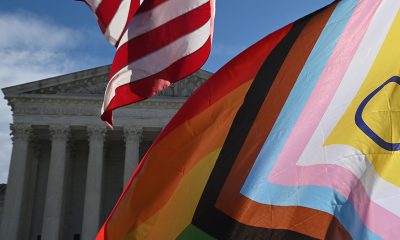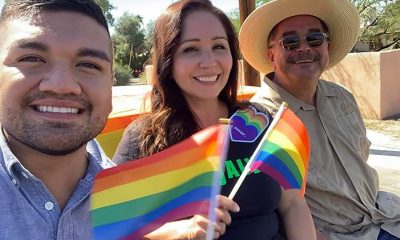News
New Mexico high court rules for marriage equality
Decision makes state the 17th with same-sex marriage on the books
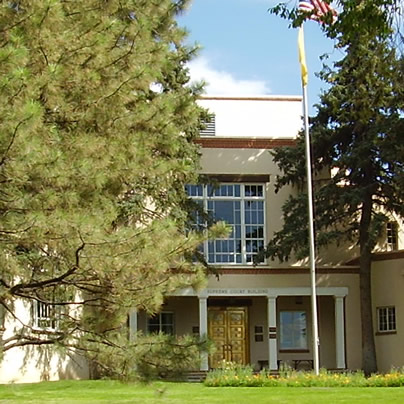
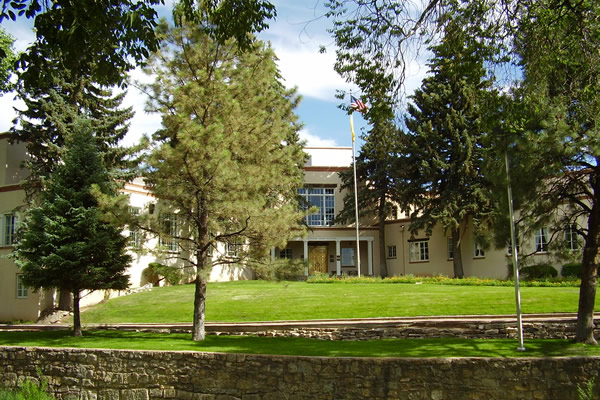
The New Mexico Supreme Court ruled in favor marriage equality. (Photo public domain)
Capping off a year of historic victories, the New Mexico high court handed down a unanimous ruling on Thursday granting same-sex couples the ability to wed in the state.
The 5-0 decision is written by Justice Edward Chavez, who concludes the current statutory scheme of the marriage law violates the Equal Protection Clause under Article II, Section 18, of the state constitution.
“We hold that the State of New Mexico is constitutionally required to allow same-gender couples to marry and must extend to them the rights, protections, and responsibilities that derive from civil marriage under New Mexico law,” the ruling states.
The ruling, which takes effect immediately, makes New Mexico the 17th state with marriage equality on the books. It also retroactively affirms the same-sex marriages for couples who already wed after obtaining marriage licenses from county clerks in the state.
The parties in the lawsuit, Griego v. Oliver, were six same-sex couples as well as all 33 of the state’s county clerks, who sought clarification on whether the state law enabled them to deliver marriage licenses to gay couples. Representing the same-sex couples were the American Civil Liberties Union of New Mexico, the national ACLU, the National Center for Lesbian Rights, the law firm of Sutin, Thayer & Browne APC as well as New Mexico attorneys Maureen Sanders, N. Lynn Perls and J. Kate Girard.
Laura Schauer Ives, legal director for ACLU-New Mexico, said the decision represents a “historic and joyful day for New Mexico.”
“As a state, we have always strived to treat all families with dignity and respect, and today’s decision allowing loving, committed same sex couples to marry continues that tradition,” Schauer Ives said. “The more than 1,000 same-sex couples who have already married in New Mexico can now rest certain knowing their marriages will be recognized and respected by our state.”
Camilla Taylor, National Marriage Project Director for Lambda Legal, commended her colleagues in the LGBT advocacy community for leading the way to a favorable decision on marriage equality in New Mexico.
“This beautiful unanimous decision explicitly underscores the argument we and our sister organizations have long made: denying same-sex couples the ability to marry imposes significant emotional and dignitary harm and is discrimination, pure and simple,” Taylor said.
New Mexico Gov. Suzanne Martinez, who opposes same-sex marriage but didn’t actively defend the marriage law, said in a statement she’ll abide by decision, but wish it were settled differently.
“My personal views on this issue are well-known, and I’m confident that most New Mexicans believe, like I do, that it should have been settled by a vote of the people,” Martinez said. “Instead, the Supreme Court stepped in and rendered their decision. While there will surely be intense debate about this decision moving forward, I encourage New Mexicans to continue to respect one another in their discourse, as this is an important issue for many New Mexicans on both sides.”
White House Press Secretary Jay Carney said immediate after the ruling he had no “official reaction,” but offered some thoughts.
“I would say that we welcome that ruling, and this is another example of the extraordinary progress that’s been made when it comes to equal rights for LGBT Americans in this country,” Carney said.
Justices make use of the June decision from the U.S. Supreme Court against Section 3 of the Defense of Marriage Act, noting the decision leaves marriage equality as the only option for same-sex couples to receive the federal benefits and for the state to avoid a federal challenge to its state law.
“Interpreting our statutes to authorize committed same-gender couples to enter into civil marriage will grant them the rights and privileges available to opposite-gender married couples in approximately one thousand statutes and federal regulations that refer to a person’s marital status, thereby avoiding a constitutional challenge on that basis,” the decision states.
The decision is the culmination of a drawn-out process over the course of 2013. It started in March with Santa Fe Mayor David Coss introducing a resolution, later approved the city council, saying marriage equality was already legal in New Mexico because of the gender-neutral construction of some portions of state law. That’s the conclusion Judge Alan Malott reached in a decision earlier this year extending marriage equality to Bernalillo and Santa Fe counties.
Notably, the court rejects in its decision the notion that marriage is already legal under the current state statutory scheme, observing that the legislature has passed laws, such as one changing the marriage application forms in 1961, defining marriage in opposite-sex terms.
“Thus, we conclude that a mix of gender-neutral and gender-specific terminology in the domestic relations statutes does not mean that the Legislature intended to authorize marriage between same-gender couples,” the decision states. “On the contrary, we conclude that the statutory scheme reflects a legislative intent to prohibit same-gender marriages.”
LGBT groups followed up with the Santa Fe resolution by filing a lawsuit on behalf of same-sex couples seeking to wed in New Mexico. Attorney General Gary King issued an opinion saying he wouldn’t defend the marriage law against a legal challenge in court on the basis that the law was unconstitutional.
Prior to the ruling from the New Mexico Supreme Court, a total of eight county clerks were already distributing marriage licenses to same-sex couples either through court order as a result of the litigation or on their own volition based on their interpretation of state law. An estimated 58.5 percent of New Mexico’s population had access to marriage equality prior to the Supreme Court ruling.
Attorney General King and plaintiffs in the case were pushing the idea that gays and lesbians are a suspect class and laws related to sexual orientation should be subject to heightened scrutiny — a idea with which New Mexico Supreme Court concurs because of the history of persecution faced by the LGBT community.
“Therefore, we conclude that intermediate scrutiny must be applied in this case because the LGBT community is a discrete group that has been subjected to a history of purposeful discrimination, and it has not had sufficient political strength to protect itself from such discrimination,” the ruling states.
It’s possible the opponents of the decision could place a state constitutional amendment on the ballot in 2014 that would rescind the decision, but only by legislative referral, not by initiative petition. It’s unclear at this time what the legislature will do. Democrats hold strong majorities in both chambers of the New Mexico legislature.
Brian Brown, president of the anti-gay National Organization for Marriage, promised in a statement to pursue action to protect people in New Mexico who don’t support same-sex marriage.
“Once again, activists judges have thrown out the historic legal understanding of marriage in New Mexico,” Brown said. “This is a continuation of a very dangerous rush towards silencing people of faith who simply believe marriage to be the union of one man and one woman. The National Organization for Marriage will do everything in its power to protect believers of true marriage in New Mexico and around the nation from the fallout of radical judges who deny the truth of marriage.”
Marc Solomon, national campaign director of Freedom to Marry, said his organization is prepared to fight to make sure the New Mexico decision stays in place.
“We have a campaign that we played a lead role in setting up and are on the board of, New Mexico Unites for Marriage, to protect the decision and defeat any efforts to amend the constitution,” Solomon said. “We’ve hired a campaign manager and there’s a field and media team on the ground, lobbyists, and more. It’s cochaired by former Republican Gov. Gary Johnson and Congresswoman Michelle Lujan Grisham.”
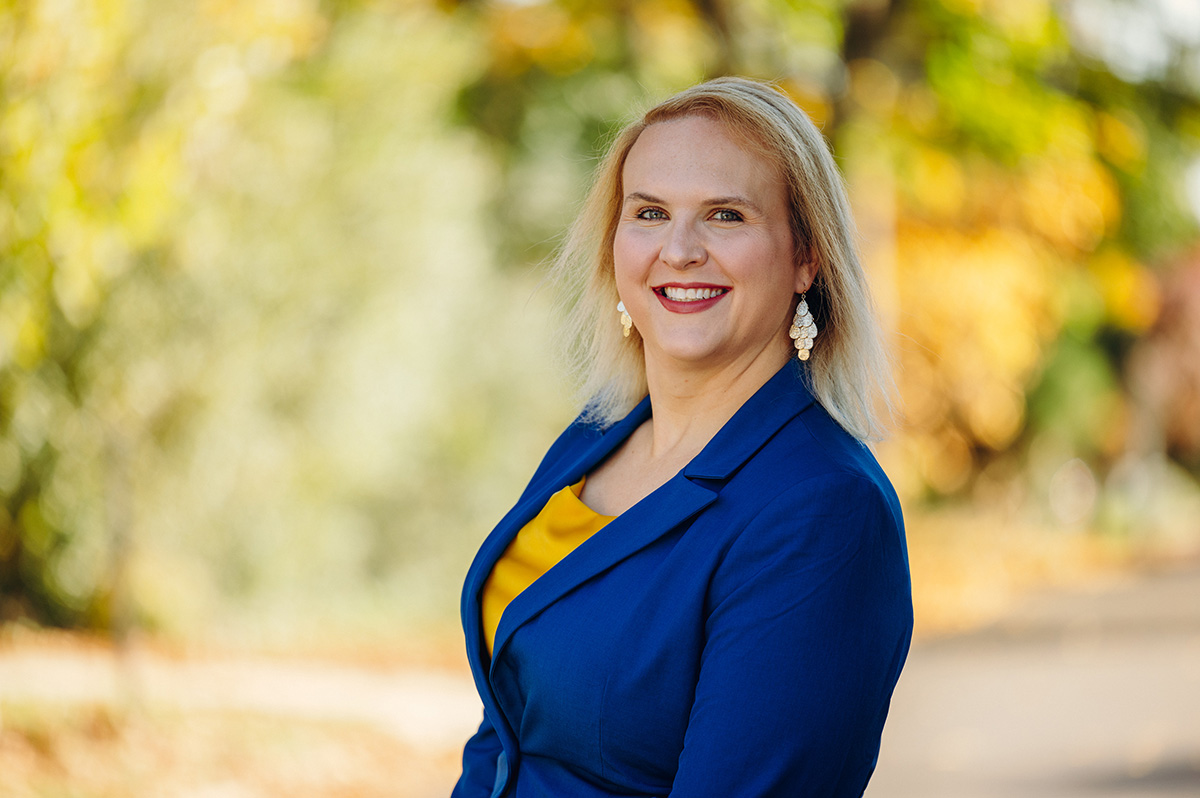
Erica Deuso will become the first openly transgender mayor in Pennsylvania.
Voters in Downingtown elected Deuso on Tuesday with 64 percent of the vote, according to the Philadelphia Inquirer. The Democrat ran against Republican Richard Bryant.
Deuso, 45, currently works at Johnson & Johnson and has lived in Downingtown since 2007. The mayor-elect is originally from Vermont and graduated from Drexel University.
Deuso released a statement following her election, noting that “history was made.”
“Voters chose hope, decency, and a vision of community where every neighbor matters,” Deuso stated. “I am deeply honored to be elected as Pennsylvania’s first openly transgender mayor, and I don’t take that responsibility lightly.”
According to a LGBTQ+ Victory Institute report released in June, the U.S. has seen a 12.5 percent increase in trans elected officials from 2024 to 2025. Still, Deuso’s campaign did not heavily focus on LGBTQ policy or her identity. She instead prioritized public safety, environmental resilience, and town infrastructure, according to Deuso’s campaign website.
Deuso has served on the boards of the Pennsylvania Equality Project, PFLAG West Chester/Chester County, and Emerge Pennsylvania, according to the LGBTQ+ Victory Fund. She is also an executive member of the Chester County Democratic Committee.
“This victory isn’t about one person, it’s about what happens when people come together to choose progress over fear. It’s about showing that leadership can be compassionate, practical, and focused on results. Now the real work begins, building a Downingtown that is safe, sustainable, and strong for everyone who calls it home,” Deuso said.
Downingtown has a population of more than 8,000 people and is a suburb of Philadelphia. The town’s current mayor, Democrat Phil Dague, did not seek a second term.
Janelle Perez, the executive director of LPAC, celebrated Deuso’s victory. The super PAC endorses LGBTQ women and nonbinary candidates with a commitment to women’s equality and social justice, including Deuso.
“Downingtown voters delivered a resounding message today, affirming that Erica represents the inclusive, forward-looking leadership their community deserves, while rejecting the transphobic rhetoric that has become far too common across the country,” Perez said. “Throughout her campaign, Erica demonstrated an unwavering commitment to her future constituents and the issues that matter most to them. LPAC is proud to have supported her from the beginning of this historic campaign, and we look forward to the positive impact she will have as mayor of Downingtown.”
Deuso will be sworn in as mayor on Jan. 7.
U.S. Supreme Court
LGBTQ legal leaders to Supreme Court: ‘honor your president, protect our families’
Experts insist Kim Davis case lacks merit
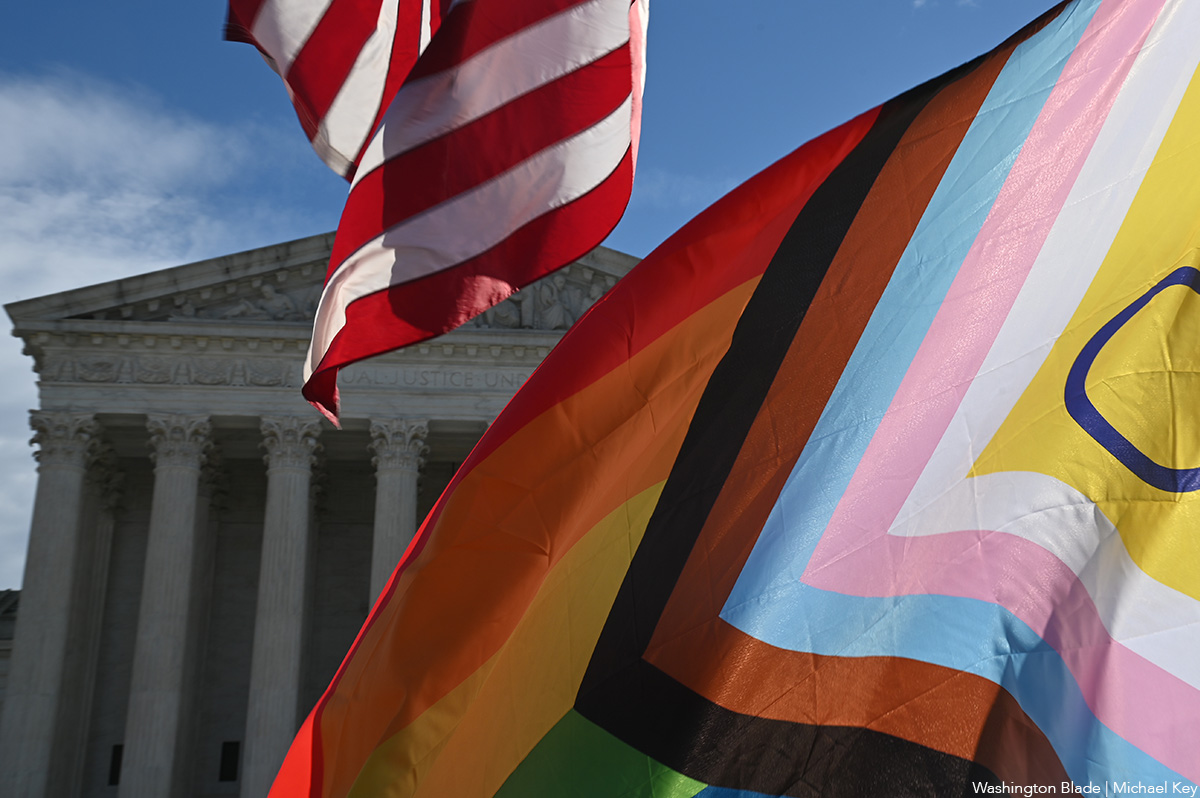
The U.S. Supreme Court considered hearing a case from Kim Davis on Friday that could change the legality of same-sex marriage in the United States.
Davis, best known as the former county clerk for Rowan County, Ky., who defied federal court orders by refusing to issue marriage licenses to same-sex couples — and later, to any couples at all — is back in the headlines this week as she once again attempts to get Obergefell v. Hodges overturned on a federal level.
She has tried to get the Supreme Court to overturn this case before — the first time was just weeks after the initial 2015 ruling — arguing that, in her official capacity as a county clerk, she should have the right to refuse same-sex marriage licenses based on her First Amendment rights. The court has emphatically said Davis, at least in her official capacity as a county clerk, does not have the right to act on behalf of the state while simultaneously following her personal religious beliefs.
The Washington Blade spoke with Karen Loewy, interim deputy legal director for litigation at Lambda Legal, the oldest and largest national legal organization advancing civil rights for the LGBTQ community and people living with HIV through litigation, education, and public policy, to discuss the realistic possibilities of the court taking this case, its potential implications, and what LGBTQ couples concerned about this can do now to protect themselves.
Loewy began by explaining how the court got to where it is today.
“So Kim Davis has petitioned the Supreme Court for review of essentially what was [a] damages award that the lower court had given to a couple that she refused a marriage license to in her capacity as a clerk on behalf of the state,” Loewy said, explaining Davis has tried (and failed) to get this same appeal going in the past. “This is not the first time that she has asked the court to weigh in on this case. This is her second bite at the apple at the U.S. Supreme Court, and in 2020, the last time that she did this, the court denied review.”
Davis’s entire argument rests on her belief that she has the ability to act both as a representative of the state and according to her personal religious convictions — something, Loewy said, no court has ever recognized as a legal right.
“She’s really claiming a religious, personal, religious exemption from her duties on behalf of the state, and that’s not a thing.”
That, Loewy explained, is ultimately a good thing for the sanctity of same-sex marriage.
“I think there’s a good reason to think that they will, yet again, say this is not an appropriate vehicle for the question and deny review.”
She also noted that public opinion on same-sex marriage remains overwhelmingly positive.
“The Respect for Marriage Act is a really important thing that has happened since Obergefell. This is a federal statute that mandates that marriages that were lawfully entered, wherever they were lawfully entered, get respect at the federal level and across state lines.”
“Public opinion around marriage has changed so dramatically … even at the state level, you’re not going to see the same immediate efforts to undermine marriages of same-sex couples that we might have a decade ago before Obergefell came down.”
A clear majority of U.S. adults — 65.8 percent — continue to support keeping the Obergefell v. Hodges decision in place, protecting the right to same-sex marriage. That support breaks down to 83 percent of liberals, 68 percent of moderates, and about half of conservatives saying they support marriage equality. These results align with other recent polling, including Gallup’s May 2025 estimate showing 68 percent support for same-sex marriage.
“Where we are now is quite different from where we were in terms of public opinion … opponents of marriage equality are loud, but they’re not numerous.”
Loewy also emphasized that even if, by some chance, something did happen to the right to marry, once a marriage is issued, it cannot be taken back.
“First, the Respect for Marriage Act is an important reason why people don’t need to panic,” she said. “Once you are married, you are married, there isn’t a way to sort of undo marriages that were lawfully licensed at the time.”
She continued, explaining that LGBTQ people might feel vulnerable right now as the current political climate becomes less welcoming, but there is hope — and the best way to respond is to move thoughtfully.
“I don’t have a crystal ball. I also can’t give any sort of specific advice. But what I would say is, you know, I understand people’s fear. Everything feels really vulnerable right now, and this administration’s attacks on the LGBTQ community make everybody feel vulnerable for really fair and real reasons. I think the practical likelihood of Obergefell being reversed at this moment in time is very low. You know, that doesn’t mean there aren’t other, you know, case vehicles out there to challenge the validity of Obergefell, but they’re not on the Supreme Court’s doorstep, and we will see how it all plays out for folks who feel particularly concerned and vulnerable.”
Loewy went on to say there are steps LGBTQ couples and families can take to safeguard their relationships, regardless of what the court decides. She recommended getting married (if that feels right for them) and utilizing available legal tools such as estate planning and relationship documentation.
“There are things, steps that they can take to protect their families — putting documentation in place and securing relationships between parents and children, doing estate planning, making sure that their relationship is recognized fully throughout their lives and their communities. Much of that is not different from the tools that folks have had at their disposal prior to the availability of marriage equality … But I think it behooves everyone to make sure they have an estate plan and they’ve taken those steps to secure their family relationships.”
“I think, to the extent that the panic is rising for folks, those are tools that they have at their disposal to try and make sure that their family and their relationships are as secure as possible,” she added.
When asked what people can do at the state and local level to protect these rights from being eroded, Loewy urged voters to support candidates and initiatives that codify same-sex marriage at smaller levels — which would make it more difficult, if not impossible, for a federal reversal of Obergefell to take effect.
“With regard to marriage equality … states can be doing … amend state constitutions, to remove any of the previous language that had been used to bar same-sex couples from marrying.”
Lambda Legal CEO Kevin Jennings echoed Loewy’s points in a statement regarding the possibility of Obergefell being overturned:
“In the United States, we can proudly say that marriage equality is the law,” he said via email. “As the Supreme Court discusses whether to take up for review a challenge to marriage equality, Lambda Legal urges the court to honor what millions of Americans already know as a fundamental truth and right: LGBTQ+ families are part of the nation’s fabric.
“LGBTQ+ families, including same-sex couples, are living in and contributing to every community in this country: building loving homes and small businesses, raising children, caring for pets and neighbors, and volunteering in their communities. The court took note of this reality in Obergefell v. Hodges, citing the ‘hundreds of thousands of children’ already being raised in ‘loving and nurturing homes’ led by same-sex couples. The vows that LGBTQ+ couples have taken in their weddings might have been a personal promise to each other. Still, the decision of the Supreme Court is an unbreakable promise affirming the simple truth that our Constitution guarantees equal treatment under the law to all, not just some.”
He noted the same things Loewy pointed out — namely that, at minimum, the particular avenue Davis is attempting to use to challenge same-sex marriage has no legal footing.
“Let’s be clear: There is no case here. Granting review in this case would unnecessarily open the door to harming families and undermine our rights. Lower courts have found that a government employee violates the law when she refuses to grant marriage licenses to same-sex couples as her job requires. There is no justifiable reason for the court to revisit settled law or destabilize families.”
He also addressed members of the LGBTQ community who might be feeling fearful at this moment:
“To our community, we say: this fight is not new. Our community has been fighting for decades for our right to love whom we love, to marry and to build our families. It was not quick, not easy, not linear. We have lived through scary and dark times before, endured many defeats, but we have persevered. When we persist, we prevail.”
And he issued a direct message to the court, urging justices to honor the Constitution over one person’s religious beliefs.
“To the court, we ask it to honor its own precedent, to honor the Constitution’s commands of individual liberty and equal protection under the law, and above all, to honor the reality of LGBTQ families — deeply rooted in every town and city in America. There is no reason to grant review in this case.”
Kenneth Gordon, a partner at Brinkley Morgan, a financial firm that works with individuals and couples, including same-sex partners, to meet their legal and financial goals, also emphasized the importance of not panicking and of using available documentation processes such as estate planning.
“From a purely legal standpoint, overturning Obergefell v. Hodges would present significant complications. While it is unlikely that existing same-sex marriages would be invalidated, particularly given the protections of the 2022 Respect for Marriage Act, states could regain the authority to limit or prohibit future marriage licenses to same-sex couples. That would create a patchwork of laws across the country, where a couple could be legally married in one state but not recognized as married if they moved to or even visited another state.
“The legal ripple effects could be substantial. Family law issues such as adoption, parental rights, inheritance, health care decision-making, and property division all rely on the legal status of marriage. Without uniform recognition, couples could face uncertainty in areas like custody determinations, enforcement of spousal rights in medical emergencies, or the ability to inherit from a spouse without additional legal steps.
“Courts generally strive for consistency, and creating divergent state rules on marriage recognition would reintroduce conflicts that Obergefell was intended to resolve. From a legal systems perspective, that inconsistency would invite years of litigation and impose significant personal and financial burdens on affected families.”
Finally, Human Rights Campaign President Kelley Robinson issued a statement about the possibility of the Supreme Court deciding to hear Davis’s appeal:
“Marriage equality isn’t just the law of the land — it’s woven into the fabric of American life,” said Robinson. “For more than a decade, millions of LGBTQ+ couples have gotten married, built families, and contributed to their communities. The American people overwhelmingly support that freedom. But Kim Davis and the anti-LGBTQ+ extremists backing her see a cynical opportunity to attack our families and re-litigate what’s already settled. The court should reject this paper-thin attempt to undermine marriage equality and the dignity of LGBTQ+ people.”
U.S. Supreme Court
Supreme Court rules White House can implement anti-trans passport policy
ACLU, Lambda Legal filed lawsuits against directive.

The U.S. Supreme Court on Thursday said the Trump-Vance administration can implement a policy that bans the State Department from issuing passports with “X” gender markers.
President Donald Trump once he took office signed an executive order that outlined the policy. A memo the Washington Blade obtained directed State Department personnel to “suspend any application where the applicant is seeking to change their sex marker from that defined in the executive order pending further guidance.”
The White House only recognizes two genders: male and female.
The American Civil Liberties Union in February filed a lawsuit against the passport directive on behalf of seven trans and nonbinary people.
A federal judge in Boston in April issued a preliminary junction against it. A three-judge panel on the 1st U.S. Circuit Court of Appeals in September ruled against the Trump-Vance administration’s motion to delay the move.
A federal judge in Maryland also ruled against the passport policy. (Lambda Legal filed the lawsuit on behalf of seven trans people.)
“This is a heartbreaking setback for the freedom of all people to be themselves, and fuel on the fire the Trump administration is stoking against transgender people and their constitutional rights,” said Jon Davidson, senior counsel for the ACLU’s LGBTQ and HIV Project, in a statement. “Forcing transgender people to carry passports that out them against their will increases the risk that they will face harassment and violence and adds to the considerable barriers they already face in securing freedom, safety, and acceptance. We will continue to fight this policy and work for a future where no one is denied self-determination over their identity.”
Justices Ketanji Brown Jackson, Elena Kagan, and Sonia Sotomayor dissented.
The Supreme Court ruling is here.
-

 District of Columbia2 days ago
District of Columbia2 days ago‘Sandwich guy’ not guilty in assault case
-

 Sports2 days ago
Sports2 days agoGay speedskater racing toward a more inclusive future in sports
-

 Celebrity News4 days ago
Celebrity News4 days agoJonathan Bailey is People’s first openly gay ‘Sexiest Man Alive’
-

 Michigan4 days ago
Michigan4 days agoFBI thwarts Halloween terror plot targeting Mich. LGBTQ bars

